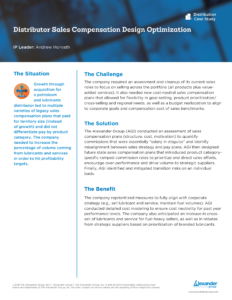Distributor Sales Compensation Design Optimization
 Situation:
Situation:
Growth through acquisition for a petroleum and lubricants distributor led to multiple varieties of legacy sales compensation plans that paid for territory size (instead of growth) and did not differentiate pay by product category. The company needed to increase the percentage of volume coming from lubricants and services in order to hit profitability targets.
Challenge:
The company required an assessment and cleanup of its current sales roles to focus on selling across the portfolio (all products plus value-added services). It also needed new cost-neutral sales compensation plans that allowed for flexibility in goal-setting, product prioritization/cross-selling and regional needs, as well as a budget reallocation to align to corporate goals and compensation cost of sales benchmarks.
Solution:
Alexander Group conducted an assessment of sales compensation plans (structure, cost, motivation) to quantify commissions that were essentially “salary in disguise” and identify misalignment between sales strategy and pay plans. Alexander Group then designed future state sales compensation plans that introduced product category-specific ramped commission rates to prioritize and direct sales efforts, encourage over-performance and drive volume to strategic suppliers. Finally, Alexander Group identified and mitigated transition risks on an individual basis.
Benefit:
The company reprioritized measures to fully align with corporate strategy (e.g., sell lubricant and service, maintain fuel volumes). Alexander Group conducted detailed cost modeling to ensure cost neutrality for past year performance levels. The company also anticipated an increase in cross-sell of lubricants and service for fuel-heavy sellers, as well as in rebates from strategic suppliers based on prioritization of branded lubricants.
Download a PDF of this Case Study »
Learn more about Alexander Group’s Distribution practice.